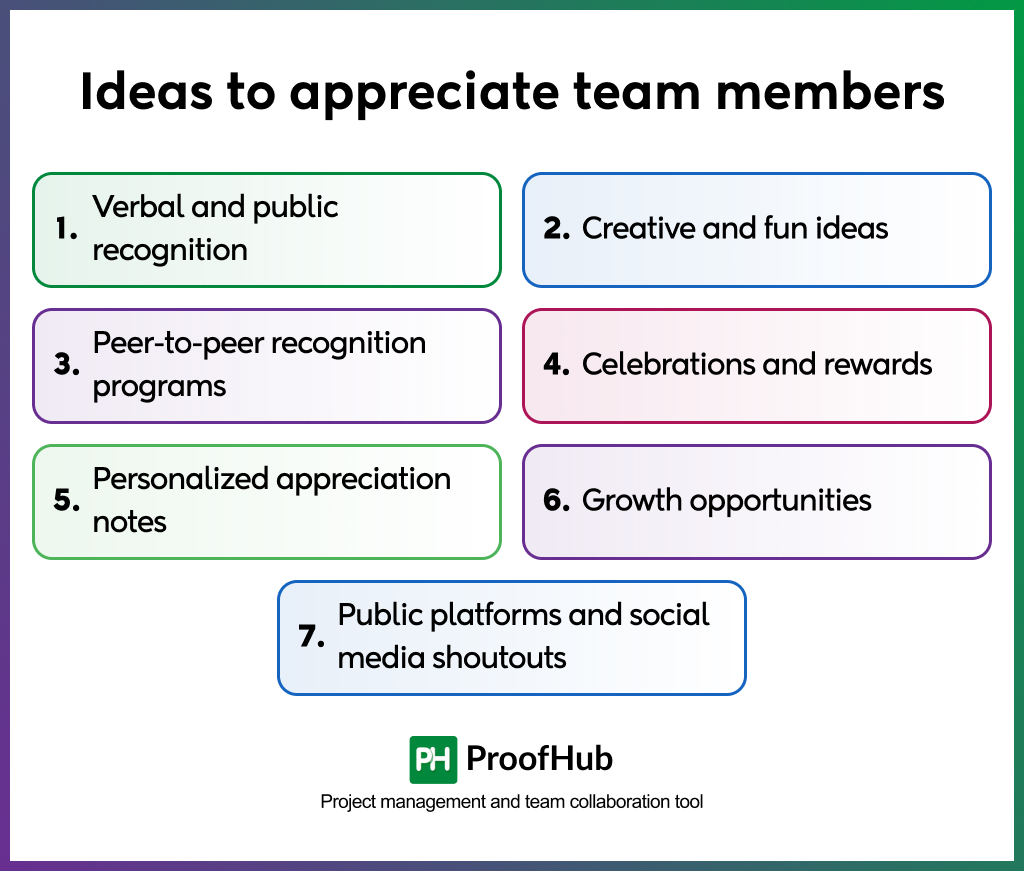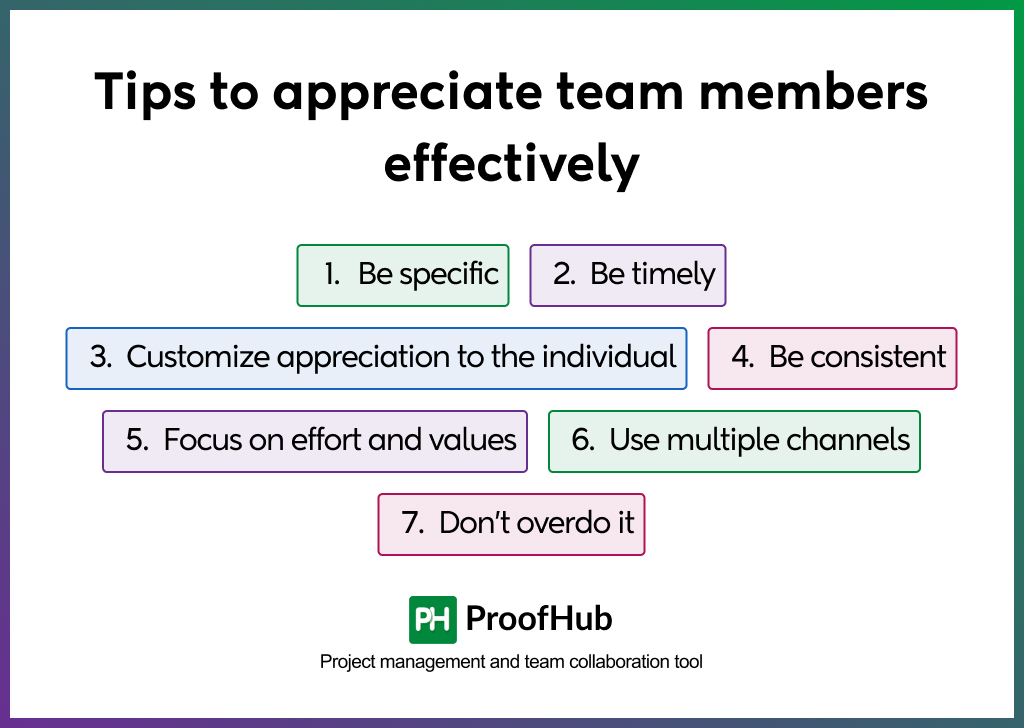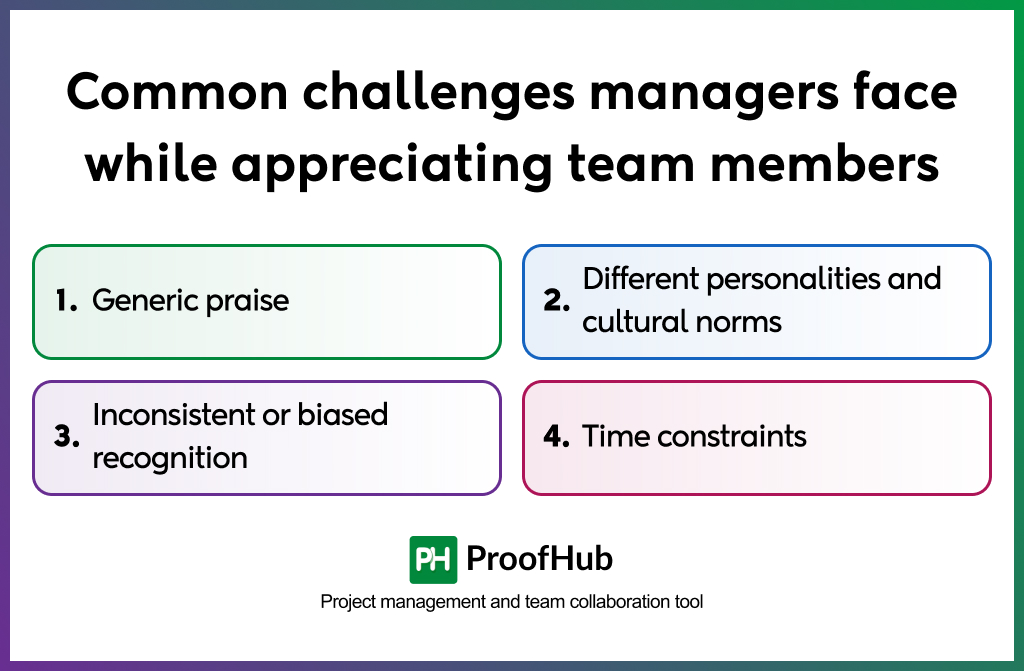If you manage a team, chances are you’ve asked yourself at some point, “Am I doing enough to keep my team motivated?” I’ve asked myself this question often throughout my experience.
And here’s what I’ve learned: consistent, genuine appreciation is one of the simplest ways to build a stronger, more connected team.
Team appreciation means recognizing the effort, commitment, and progress your team makes every day. It’s about making them feel seen, heard, and valued for what they do. This leads to improved collaboration, higher morale, and increased performance.
In this article, we’ll explore why team appreciation is essential, its types, creative ideas and tips to do it effectively, and solutions to common challenges you can face.
Let’s get started!
Why is appreciating team members important?
Appreciation is an effective management practice. When managers genuinely recognize and value their team’s efforts, they improve their performance and yield better results.
Every employee wants to know that their work matters. A simple “thank you” or recognition for a well-done job can increase motivation, focus, and team morale.
Without appreciation, even high-performing teams may feel ignored or undervalued. Over time, this can lead to disengagement, lower productivity, and eventually, people leaving.
On the other hand, regular appreciation helps build trust, respect, and a positive work environment where employees are inspired to contribute their best and grow alongside the organization.
Here are a few benefits of appreciating your team members:
- Better engagement: Appreciative team members are more invested in their work. They are attentive, energetic, and take initiative without needing constant oversight.
- Reduced turnover: When employees feel valued, they tend to stay. Regular appreciation lowers the risk of losing skilled team members and saves the cost and effort of hiring new ones.
- More accountability: When team members know their efforts are seen and recognized, they naturally take accountability for their tasks. They become more responsible and committed to delivering quality results.
Also read: 25 Employee recognition ideas to appreciate your team’s hard work
Ideas to appreciate team members
Here are some ideas you can use to recognize your team’s efforts:

1. Verbal and public recognition
A simple ‘thank you’ spoken at the right moment can lift someone’s day and boost their confidence. Employee recognition doesn’t always have to be written or formal; just say it out loud and mean it.
Hearing praise in front of others makes employees feel proud of what they do. It creates a culture that values effort and encourages others to follow that lead.
How to do it?
- Give shoutouts during team meetings.
- Highlight “wins of the week” to celebrate small victories.
- Mention individual contributions in townhalls or all-hands meetings.
2. Creative and fun ideas
Breaking away from routine to celebrate wins playfully adds joy to the workplace. It reminds your team that work is not only about tasks, but also about people.
Fun brings energy into the team. These activities make appreciation a natural, enjoyable part of your team culture.
How to do it?
- Build a virtual or physical team appreciation wall.
- Start a “pass the praise” chain email where everyone thanks someone and keeps it going.
- Try “Appreciation Bingo” with fun recognition challenges or virtual games.
3. Peer-to-peer recognition programs
When teammates appreciate each other, it creates a culture of positivity and shared success. It also means good work gets noticed, even if you’re not there to see it.
Peer recognition strengthens team unity. It makes individuals feel valued by those they collaborate with daily, replacing silent competition with a culture of support and mutual uplift.
How to do it?
- Encourage team members to recognize each other.
- Set up a simple recognition program or use a tool like ProofHub.
- Create a weekly “team kudos” moment to highlight peer praise.
4. Celebrations and rewards
Whether it’s a small win or a significant milestone, acknowledging it with a simple reward or moment of celebration boosts morale.
Celebrations break the routine, give people something to look forward to, and help everyone stay motivated and connected.
How to do it?
- Host team lunches (virtual or in-person) or treat the team to coffee.
- Celebrate personal milestones like birthdays or work anniversaries.
- Mix budget-friendly ideas (like thank-you or e-gift cards) with bigger rewards sometimes.
5. Personalized appreciation notes
A personal short note can show you’re paying attention. They are thoughtful, and team members often remember them for a long time. This strengthens your connection with each team member and builds trust.
How to do it?
- Send digital or handwritten thank-you notes.
- Mention the person’s name and exactly what they did.
- Use templates to make it easier and save time.
Also read: 81 Employee appreciation quotes to recognize your dedicated team
6. Growth opportunities
Giving your team members chances to grow shows you see their potential and believe in what they can achieve.
When team members see you supporting their growth, they feel valued beyond their current role. This builds loyalty and motivates them to do their best.
How to do it?
- Assign stretch projects that challenge their skills.
- Provide opportunities for training or mentorship.
- Ask about individual career goals and check in regularly on progress.
7. Public platforms and social media shoutouts
Public appreciation on social media or internal platforms can boost team members’ confidence and highlight their contributions.
Public praise increases visibility and shows the team that their efforts are recognized. It can motivate others to strive for excellence and reinforce desired organizational behaviors.
How to do it?
- Share wins on LinkedIn, internal blogs, or newsletters.
- Tag team members (with their permission) and explain their contributions.
- Be honest and specific to avoid sounding forced.
When should you appreciate a team member?
The short answer? More often than you think.
You don’t need a stage to appreciate your team members. The most meaningful recognition often happens in everyday moments. For managers, knowing when to enjoy a team member is as important as how you do it.
Here are some moments to show your appreciation:
- Immediately after the action: Don’t wait. When someone does something well, solves a problem, or shows great teamwork, acknowledge it immediately. Quick appreciation reinforces the behavior and shows that you’re paying attention.
- At key milestones: Project completed? Deadline met ahead of schedule? That’s the perfect time to recognize the effort that went into it. A well-timed “Well done, everyone!” boosts team morale and encourages consistency.
- During review meetings: Performance reviews and one-on-one sessions aren’t only for feedback but also to highlight what’s going well. Take a moment to say, “I appreciate how consistent and dependable you’ve been.” That simple acknowledgement builds trust and motivation.
- At random times: Appreciation doesn’t always need a reason. Notice someone’s attitude, effort, or positive energy? Say something. Small, unplanned gestures can brighten someone’s day and strengthen team connections.
How often should you recognize your team members?
Consistency is essential when it comes to appreciation. You don’t always need grand gestures; small, regular recognition can motivate your team and strengthen morale.
Here’s a simple rhythm managers can follow:
- Weekly micro-recognitions: Take a few minutes to appreciate small wins, whether a helpful idea or a task done well. A quick message or shoutout during a meeting is enough. These simple gestures show that you notice and value your team’s work.
- Monthly team-wide shoutouts: Use monthly meetings to highlight team and individual achievements. Recognize progress and share wins. This builds morale, strengthens team culture, and keeps everyone motivated and aligned with the overall goals.
- Annual celebrations: Celebrate major milestones—project successes, work anniversaries, and team achievements—once a year to help people feel proud of what they’ve built and strengthen long-term connections.
Tips to appreciate team members effectively
Appreciation builds trust, keeps teams motivated, and improves performance. But it only works when it’s done right.

Here are a few tips to appreciate your team members effectively:
- Be specific: “Great job” sounds nice, but it doesn’t tell your team what they did well. So, be clear and direct.
For example: “Your presentation yesterday was clear, confident, and well-researched. It helped us win the client’s trust.” Specific feedback shows you’re paying attention and that their efforts are recognized and appreciated.
- Be timely: Don’t wait until the next review cycle to share praise. Recognition has the most impact when it’s given right after the action.
A quick word after a meeting or a short message that same day reinforces positive behavior. The sooner you acknowledge good work, the stronger the motivation becomes.
- Customize appreciation to the individual: Not everyone enjoys the spotlight. Some feel proud with public praise, others appreciate a quiet thank-you in a one-on-one chat.
Know how each team member prefers to be recognized and respect their choices.
- Be consistent: Don’t let appreciation become a once-in-a-while gesture. Make it part of your routine.
Add it to weekly check-ins, team meetings, or dashboards. Consistent appreciation boosts morale, strengthens trust, and creates a positive work culture.
- Focus on effort and values: Yes, results matter, but so does the how. Celebrate moments when someone shows creativity, resilience, teamwork, or takes initiative.
This shows your team that you value their effort, attitude, and teamwork, building a stronger, more motivated team over time.
- Use multiple channels: Praise doesn’t always need to be spoken. Try writing a quick note or sending a team-wide email.
You can also mention someone in a team-wide announcement, or even drop a thank-you on a sticky note. Different channels can help you show gratitude effectively and reach more people.
- Don’t overdo it: Too much praise can seem forced or even fake. Keep it sincere, grounded, and balanced.
Appreciation should be honest, not just a routine. Say it when it counts, and make it count when you say it.
Common challenges managers face while appreciating team members
Most managers understand that team appreciation improves morale, engagement, and performance. Yet, consistently appreciating team members meaningfully is easier said than done.

Here are some common challenges that you can face while recognizing your team members:
- Generic praise: Saying “good job” or “well done” without context often lacks impact. When appreciation is vague, it doesn’t show that you’ve noticed the specific effort or result. Over time, it starts to feel routine rather than sincere.
So, be specific while appreciating someone. Instead of saying “Great job,” mention what exactly they did. Specific praise makes people feel genuinely valued, not just acknowledged out of routine.
- Different personalities and cultural norms: Not everyone responds to praise similarly. While some team members welcome public recognition, others prefer private feedback. Cultural backgrounds also influence how appreciation is perceived, making it essential to understand what works best for each individual.
Take time to learn how each team member prefers to be recognized. Some may enjoy being praised during team meetings, while others value a quick message or one-on-one conversation. When appreciation aligns with individual comfort levels and cultural expectations, it becomes more authentic and respectful.
- Inconsistent or biased recognition: Without a structured approach, appreciation may be given more often to the most vocal or visible individuals while others are unintentionally overlooked. This imbalance can create perceptions of unfairness and reduce team morale.
Set aside five minutes at the end of the week to reflect on what went well and who contributed. You can also track small wins in a shared document or use tools to recognize different team members over time. Consistency avoids unintentional bias and ensures everyone is appreciated for their efforts.
Explore this comprehensive list of employee recognition software that is used widely across the globe
- Time constraints: With packed schedules and ongoing demands, it’s easy to deprioritize appreciation. Many managers don’t have the time or energy to pause and acknowledge wins, especially when dealing with stress or burnout.
Integrate appreciation into your daily conversations, right when you notice great work. When it becomes a regular part of your communication, it won’t seem like another thing on your to-do list.
Important team appreciation statistics
Regular, genuine appreciation helps managers retain talent, improve morale, and increase efficiency.
Here are a few statistics that show why you need to make team appreciation a priority:
- 69% of employees say they would work harder if their efforts were recognized.
- According to Gallup’s workplace recognition research, Employees who feel appreciated are 2.9 times more likely to be engaged at work.
- Organizations with employee recognition programs see 31% lower voluntary turnover.
- 28% of the most memorable recognition comes from an employee’s manager.
- According to a research by Deloitte, Recognition leads to a 14% improvement in performance and productivity of employees.
Also read: Top 20 employee recognition statistics in 2025
How ProofHub helps managers build a culture of team appreciation
Team appreciation is one of the most effective ways to boost morale, build trust, and motivate employees.
Yet appreciation is often overlooked in the daily rush of meeting deadlines. A dedicated tool can help you keep your projects on track and recognize your team’s efforts in real time.
One such tool is ProofHub – an all-in-one project management and team collaboration tool. It brings all your tasks, communication, milestones, recognition, and more together in a single place.
So, how does ProofHub help you build a culture of team appreciation?
- Give real-time feedback: Task comments and discussions allow you to acknowledge good work right when it happens, improving team engagement and productivity.
- Celebrate wins publicly: Whether someone meets a strict deadline or takes initiative without being asked, you can highlight their effort with team-wide announcements. This reinforces positive behavior and also motivates others to do their best.
- Acknowledge key contributions: Set and track project milestones and use them as moments to recognize achievements, keeping the team aligned and focused on long-term goals.
- Keep praise centralized: Whether in project discussions, announcements, or chat threads, appreciation stays in one place—organized and accessible, making it easy to recognize and revisit positive feedback.
With everything in one platform, ProofHub helps managers weave appreciation into the workflow without extra effort.
What’s the difference between recognition and appreciation?
Recognition means praising someone for their work, such as finishing a project on time or achieving a goal. It’s usually related to results and often done publicly.
On the other hand, appreciation refers to valuing someone for who they are – their effort, attitude, or the positive energy they bring. It’s more personal and ongoing, not just about achievements.
What are the types of appreciation?
There are several ways to show appreciation. Here are a few common types:
- Verbal appreciation: Saying “thank you” or giving a compliment.
- Written appreciation: Sending a note, email, or message to express gratitude.
- Public appreciation: Acknowledging someone in front of others, like in a meeting or group chat.
- Tangible appreciation: Giving a small gift, reward, or token of thanks.

